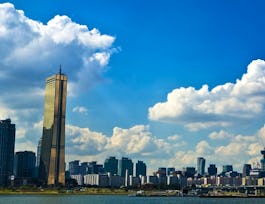This course will select six most outstanding issues in contemporary Korean politics and will engage in an in-depth, interactive inquiry of those issue. They include Korean politics in history, institutional setting of Korean politics, and dynamics of political culture in Korea, profiles of political leadership, myth and reality of the developmental state and the Korean economic miracle, and debates on Korean unification. The course will expose students to contending theories and empirical reality at first hand.


Understanding Korean Politics
Taught in English
Some content may not be translated
21,274 already enrolled
(257 reviews)
Details to know

Add to your LinkedIn profile
6 quizzes
See how employees at top companies are mastering in-demand skills


Earn a career certificate
Add this credential to your LinkedIn profile, resume, or CV
Share it on social media and in your performance review

There are 6 modules in this course
During Week 1, leaners will have an overview of Korean Politics which includes past history, the presidents and the main historical events during the 1st to the 6th Republic, and the democratic transition in 1987. The first week will help learners develop a fundamental understanding of the historical development of Korean Politics and lead leaners to think what makes Korean Politics new and interesting.
What's included
5 videos1 reading1 quiz1 discussion prompt
Week 2 will first summarizes the four legacies of South Korea’s politics from 1948 to 1987 and introduce the major concepts and models of democratic transition. Second, it will give a clear and detailed explanation about South Korea’s democratic transition which includes the transition dynamics, the determinants of democratic transition and the democratic consolidation.
What's included
5 videos1 reading1 quiz1 discussion prompt
Week 3 will start with the explanation of institution including its concept, types and major issues. In the second part, the lecture will expound South Korea’s constitutional foundation and its evolution, focusing on its nine constitutional amendments. Then it will talk about the structure and features of South Korean government, also it will briefly introduce South Korea’s presidential system which will be further explained in next week.
What's included
5 videos1 reading1 quiz1 discussion prompt
Week 4 will mainly talk about the political leadership. The lecture will first give the definition, types and evaluation criteria of political leadership. Then it will evaluate President Rhee Syngman, Park Chung-hee and Kim Dae-jung by using the criteria given in the first part and lead leaners to discuss the unique pattern of South Korean leadership.
What's included
6 videos1 reading1 quiz1 discussion prompt
Week 5 will give leaners a very clear explanation of South Korean economic development, including its original conditions, economic take-off and economic crisis. Then the lecture will talk about the limits of developmental state and lead leaners to discuss about the future of South Korean economy.
What's included
5 videos1 reading1 quiz1 discussion prompt
The main topic of week 6 is Korean unification. The lecture will start with explanation of inter-Korean relationship to help learners form a better understanding towards Korean unification. Then it will expound and evaluate the Sunshine policy. And the last part will have learners discuss about the future of Inter-Korean relations and unification.
What's included
12 videos1 reading1 quiz1 discussion prompt
Instructor

Offered by
Recommended if you're interested in Governance and Society

Yonsei University

Yonsei University

Sungkyunkwan University

Sungkyunkwan University
Why people choose Coursera for their career




Learner reviews
Showing 3 of 257
257 reviews
- 5 stars
85.99%
- 4 stars
12.06%
- 3 stars
1.16%
- 2 stars
0.77%
- 1 star
0%

Open new doors with Coursera Plus
Unlimited access to 7,000+ world-class courses, hands-on projects, and job-ready certificate programs - all included in your subscription
Advance your career with an online degree
Earn a degree from world-class universities - 100% online
Join over 3,400 global companies that choose Coursera for Business
Upskill your employees to excel in the digital economy
Frequently asked questions
Access to lectures and assignments depends on your type of enrollment. If you take a course in audit mode, you will be able to see most course materials for free. To access graded assignments and to earn a Certificate, you will need to purchase the Certificate experience, during or after your audit. If you don't see the audit option:
The course may not offer an audit option. You can try a Free Trial instead, or apply for Financial Aid.
The course may offer 'Full Course, No Certificate' instead. This option lets you see all course materials, submit required assessments, and get a final grade. This also means that you will not be able to purchase a Certificate experience.
When you purchase a Certificate you get access to all course materials, including graded assignments. Upon completing the course, your electronic Certificate will be added to your Accomplishments page - from there, you can print your Certificate or add it to your LinkedIn profile. If you only want to read and view the course content, you can audit the course for free.
You will be eligible for a full refund until two weeks after your payment date, or (for courses that have just launched) until two weeks after the first session of the course begins, whichever is later. You cannot receive a refund once you’ve earned a Course Certificate, even if you complete the course within the two-week refund period. See our full refund policy.


